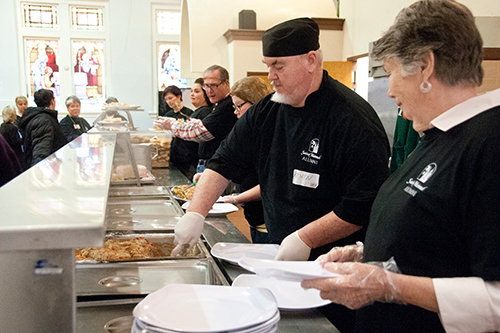
Listen to Our Podcast
Echoes from the Bell Tower, a podcast devoted to stories of wit and wisdom from the monks of Saint Meinrad.
Gospel - Poverty
Fr. Adrian Burke, OSB
Thursday, May 9, 2019

"Whoever has less should thank God and not be distressed, but whoever needs more should feel humble because of his weakness..." Rule of St. Benedict 34.3
Blessed Columba Marmion, an Irish Benedictine monk and abbot of the 19th century, was a prolific writer on what it means to be a monk. For him, it seems to come down to one thing: a monk is one who emulates Christ in every aspect of his life.
Morning Prayer is early for us, but I usually start off pretty attentive (provided I have a good dose of caffeine in me), but by the time of the second reading, I'm starting to get tired. Pretty normal stuff for that time of day, at least for me.
But one Monday morning I sat up with greater attention at a reading from Blessed Columba Marmion. It included a story of something that happened to St. Catherine of Siena (her feast day was that day).
Abbot Columba tells the story of Catherine giving a poor man begging for alms a small silver cross because she had no money with her at the time. She offered to go home and get some money for him, but the man didn't want to wait, so he gladly took the cross and went away content.
St. Catherine writes in her spiritual journal that she had a vision while at prayer wherein Jesus showed her that same cross, embellished now with jewels. She reports Jesus saying that when she arrives home (in heaven), He will present it to her since she loved Him, Jesus, enough to give it to Him in this life (notice the identification Jesus makes with the poor - see Mt. 25:40).
Catherine demonstrates true evangelical poverty, a spiritual attitude with respect to our possessions that frees us to be and to do for others what charity demands.
Catherine was a 14th-century lay woman (a Dominican tertiary), and her witness and writings so reflect what it means to be a serious Christian that she was declared a "doctor of the Church," a faithful teacher of a gospel message universally valid for Christians in every generation.
Abbot Columba wanted to share this story because he was teaching his monks what true gospel-poverty is about. Benedictine monks embrace a way of life that, according to the Holy Rule, demands a radically new way of relating to our possessions - either personal stuff or what belongs to the community.
Nothing of what we receive in life - whether possessions, or talents, or even our very existence - is intended to be ours alone; all that we have is from God, and all that we have is meant to be shared.
Gospel-poverty is a way of staying attentive to how we relate to what we possess - are we free or are we possessive? Do I possess what I have, or does what I have possess me? Do I get jealous of "my time," or can I be generous in sharing myself with others?
Christian life is shared life, and by sharing with others we participate in the fullness of Christ's Risen Life by living as Christ did: living for others. This is why St. Benedict was so adamant that a monk not be attached to what he is given, but learn to see all that he possesses are gifts to share.
Spiritual poverty is an attitude that establishes the community in love. Jesus said it this way: Blessed are the poor in spirit, for to them belongs the Kingdom of Heaven! (Mt. 5:3).